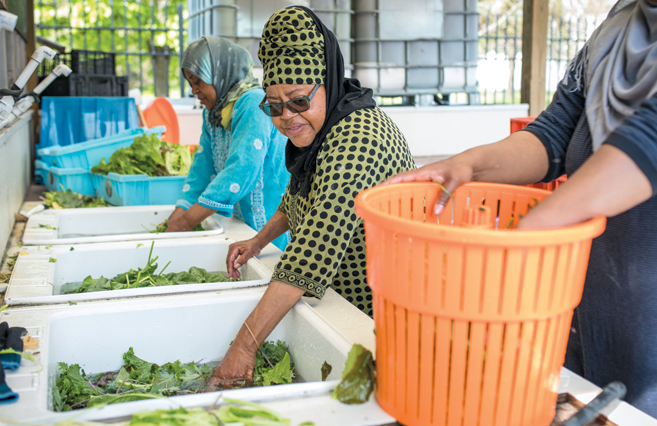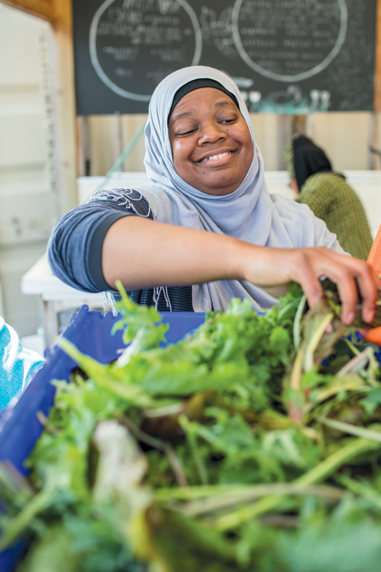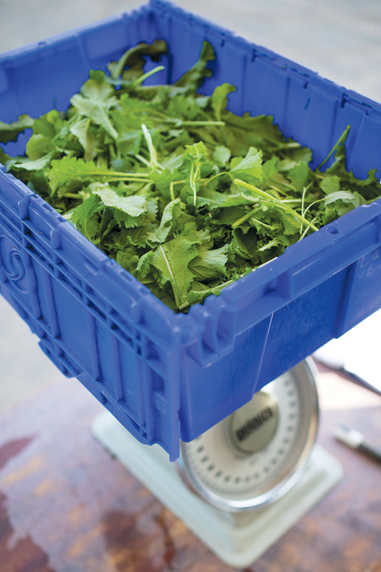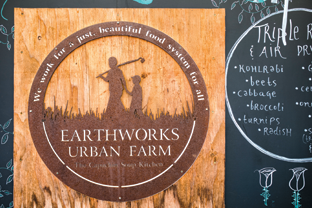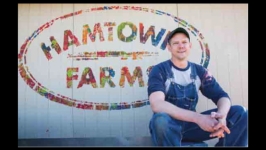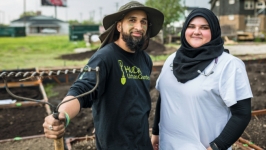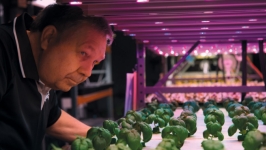Earthworks Urban Farm Fuels Detroit Soup Kitchen
It’s been a long, cold spring on Detroit’s Lower East Side, but a warm sun is shining on this Monday morning as farm trainees inspect the garden on their weekly crop walk at Earthworks Urban Farm. As they move through rows of newly planted spring crops, including radishes, arugula, spicy greens and mustards, these nine participants of the Earthworks Agriculture Training (EAT) program carefully take notes. They’re looking to see what changes have occurred since the prior week’s inspection and determine what work needs doing for the coming week.
In the hoop house, newly planted tomatoes are protected from the spring chill, getting a jump on the season. Volunteers are busy cutting up seed potatoes so they can dry in preparation for planting. Later, the trainees will plant summer squash to add to the hoop house’s bounty. The air is full of excitement tinged with a sense of urgency. The cold April has delayed progress, and Wendy Casey, Earthworks’ community outreach specialist, knows there’s lots of work to do to catch up. The friars of the Capuchin Soup Kitchen on Meldrum Street created The Earthworks Urban Farm in 1997. A religious order who follows the example of St. Francis of Assisi, the Capuchins serve those in need in the neighborhoods on Detroit’s Lower East Side through counseling, teaching and food.
The garden was the brainchild of Friar Brother Rick Samyn, who was inspired to connect area youth—who he had witnessed getting much of their nutrition from local gas stations—with how food is grown.
In the years since the gardens’ inception, the program has grown and hosted hundreds of volunteers every year, contributing tons of produce to the soup kitchen. A weekly market stand, called the Meldrum Fresh Market, is open during spring, summer and early fall on Thursdays from 11am to 2pm. Visitors from around the world come to learn about what the Capuchins have created here, which qualifies as one of the most sustainable examples of urban agriculture anywhere.
The EAT program launched in 2010, just as Detroit’s urban agriculture movement was gaining steam. The program’s mission is to provide Detroit residents with skills to succeed in agriculture. An average of nine people participate each year, several of whom have created their own businesses using skills gained in the program.
“We have caterers, and we have people that started up their own farms,” says Casey. “Others have created value-added-type businesses, meaning they may not necessarily grow food to sell but they incorporate some of what they grow into their product.” These businesses include Madiscents, a line of natural herbal skin care products; Uncle Willie Grows, an herb, vegetable, fruit and flower producer; and House Botanicals, a “botanical being workshop” that trains clients to work with plants including flower arrangements and terrarium design.
Most of the EAT participants come from the surrounding neighborhoods, which include some of Detroit’s most impoverished areas. Many are recruited as guests of the soup kitchen, while others are referred from the farm’s many partner organizations in the surrounding community.
One of those partners is Keep Growing Detroit, a citywide resource center for urban agriculture. EAT participants help grow some of the thousands of transplants distributed by KGD to urban farmers across Detroit each spring.
“The EAT program is set up so that when it starts, it’s right at the beginning of transplant production,” says Casey. “So they learn how to start from a seed, and how to germinate that seed and create a transplant inside of a controlled environment, which is the hoop house.”
Participants learn how to manage a variety of growing conditions, including watering requirements and temperature management in the hoop house. They also learn field production, attend beekeeping workshops throughout the season and make and can jams from a variety of berries grown on the farm. Participants also learn to set up and run the farm stand, gaining valuable customer-service skills.
“It goes from seed to table,” says Casey. “And 90% of what we grow here we donate to the soup kitchen.”
Casey is excited about this years’ farm market, because it will be her first year running the stand after graduating from the EAT program herself. She has set a goal to make the produce from Earthworks more accessible to seniors in the area.
“My outreach work entails making connections with some of the senior agencies and housing complexes in the area,” she says. “We’re going to start offering food and nutrition programs geared towards seniors. Many of the seniors don’t have access to fresh fruits and vegetables. There aren’t any grocery stores, and a lot of people don’t know about our weekly market. I want to increase their access.”
For Casey, the work of Earthworks Urban Farm is not only about helping people but about empowering them.
“By having the soup kitchen, we not only feed people and nourish bodies, but we also feed souls,” she says. “We teach people that they can grow their own food. I think that’s really important, because a lot of times that empowerment piece is not there. Some people see a soup kitchen and say, ‘Oh, they’re just giving away food.’ But it’s not about that. We don’t pass judgment on people, but we do also teach people that they can grow their own food. And that’s very empowering, and it allows people to be self-reliant.”
Learn more at Earthworks


